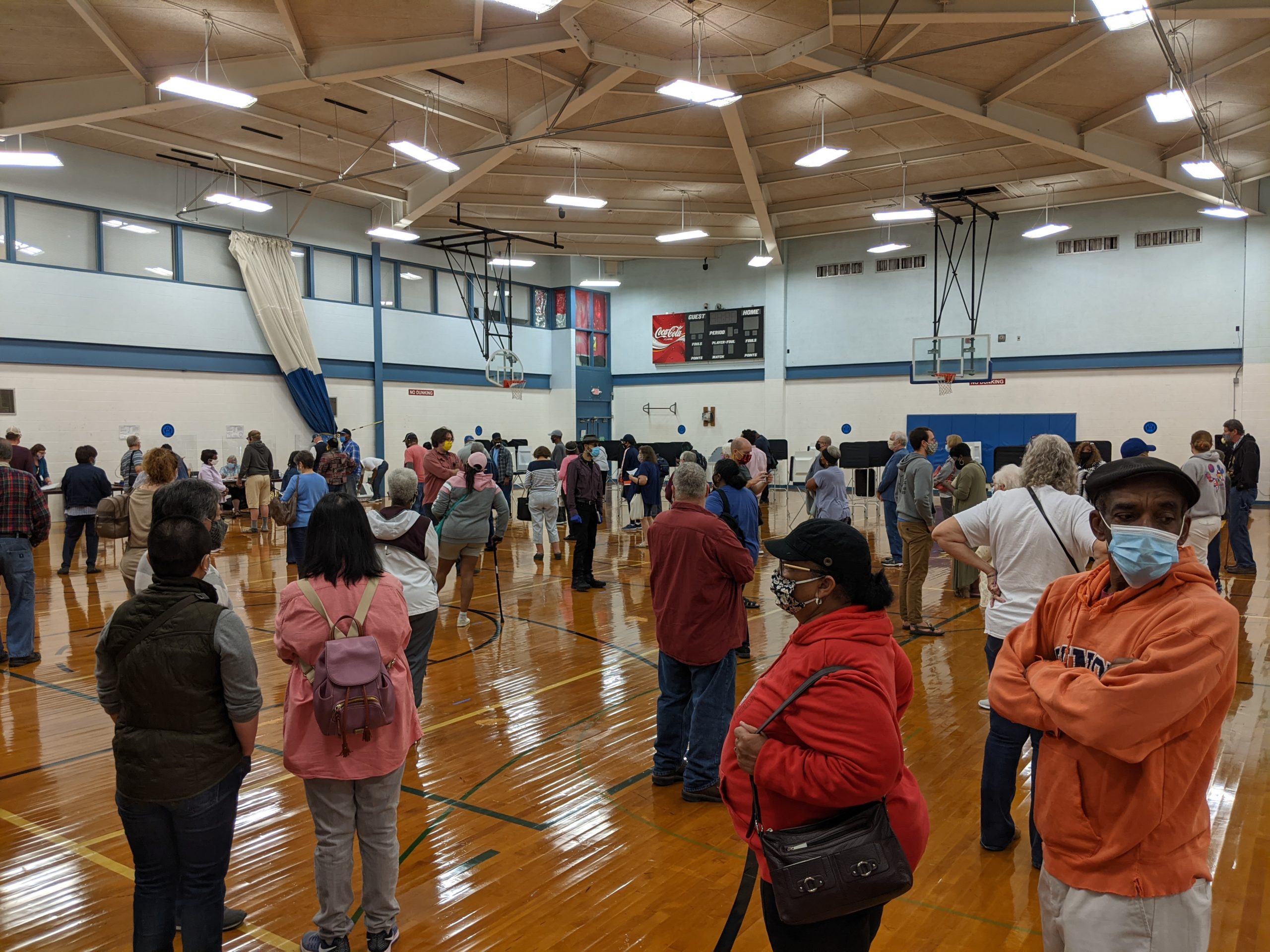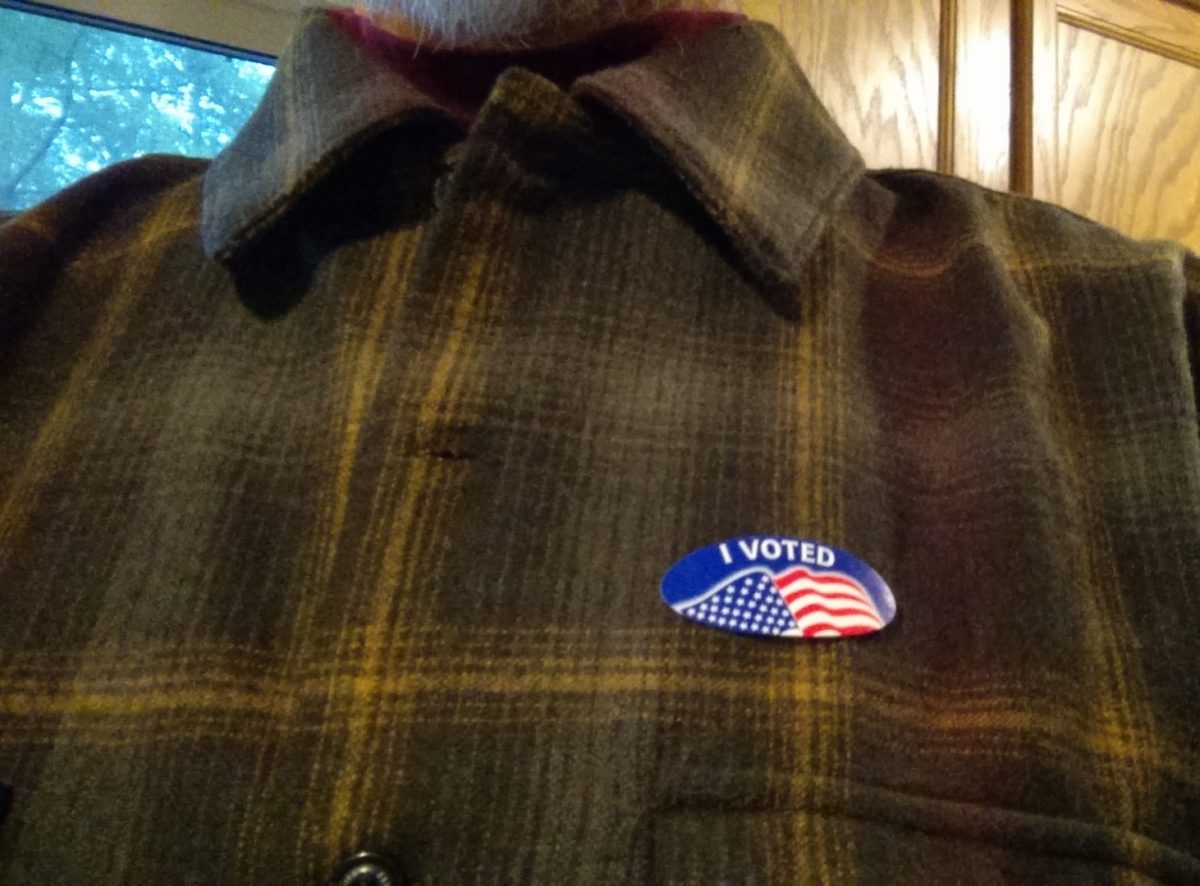Walked with @jackieLbrewer to a nearby venue for early voting, and exercised the franchise. The walk was also a bit of exercise, although after I went for a run as well. 🏃


Walked with @jackieLbrewer to a nearby venue for early voting, and exercised the franchise. The walk was also a bit of exercise, although after I went for a run as well. 🏃

We (@jackieLbrewer and I) have exercised the franchise—early voting in the primary.


Polls have been open for early voting for about 45 minutes. The room is pretty full, but everybody is masked and keeping proper social distance.
I marvel that the 1% is being so indifferent to the large and widening leftward political shift in the U.S. and elsewhere. It seems to me they should have already started telling their politicians, “Give the poor folks 20% of what they want, quick! We need to nip this in the bud!”
Of course, maybe they’re right and I’m wrong.
They got away with globalization, after all. And then they got away with the financial crisis. And so far they’ve gotten away with Trump’s tax cut.
Now, I can understand the first two. Globalization, despite how it crushed many individuals, families, and communities, did make people better off on average. Having the average person end up better off makes a policy supportable at some level. I can see it providing enough political cover for them to get away with it. Who doesn’t like buying cheap crap at WalMart? Nobody but freaks and weirdos like me.
The financial crisis is harder to understand, which I think is due mainly to it being harder to understand. There was a real sense that our whole economy could implode—and it was a real sense because it was actually true. The technocrats managed to save the economy, so they get some credit for that. They did it in a way that crushed homeowners, which is bad. They did it in a way that subverted the rule of law, which is bad. And they did it in a way that crushed a whole generation, which is also bad. But they did save the economy.
But now we’ve got multiple cohorts of people who have already turned against the system. It’s no longer just the freaks and weirdos who care about their local community and the natural systems that support life. It’s no longer just former homeowners whose homes were seized to save the banks. It’s no longer just millennials who graduated into a job market so bad that they’re a decade behind their parents’ generation in things like family formation (and further than that in preparing to retire).
Now it’s basically everybody except the 1% who is being harmed, and they’re being harmed right now, every day.
The Trump tax cut is just a naked grab at wealth by the wealthy. It didn’t help anybody else. Trump’s tariffs aren’t even that—they don’t help anything but Trump’s ego.
I cannot imagine that any amount of voter suppression and gerrymandering—even with the structural anti-democratic features of our constitution—will keep the supermajority of people being harmed by our current system from making some major changes.
If the 1% had any sense they’d have thrown some bones to the people already. I can’t imagine that the smart ones haven’t figured this out already.
Sure, there are plenty of dumb ones who figure that they can build a survival bunker in Alaska or New Zealand and survive the ensuing revolution and climate catastrophe. But are they really all that dumb?
Evidence so far suggests they are.
Or maybe they’re right and I’m wrong.

After being briefly disappointed that the blue wave didn’t materialize as strongly as I’d hoped, I find that I am nevertheless rather hopeful about the future of our democracy.
This hopefulness springs from two causes. First, there are already more Democratic voters than there are Republican. Second, the Fifteenth Amendment is already part of the constitution.
The number of votes cast for a Democratic House candidate exceeded the number cast for a Republican House candidate by well in excess of 4 million votes. We’re already in the majority by several percentage points.
The reasons we don’t already control the levers of power are well understood. The Constitution, through the Senate and the Electoral College, give excess power to small states which currently lean Republican. The Republicans have been more shameless about gerrymandering. Voter suppression efforts targeted at ethnic minorities and at the young have been effective at reducing votes for Democrats.
Even if all of those things stay the same, we’re still a majority, and over time that will win out.
We will probably take control even before time (and demographic changes) bring us to that point. All it will take is a leader charismatic enough to produce some modest coattails, and we’ll once again have a Democratic government.
Once that happens, I very much hope, the Democrats will seize the opportunity to put an end to the gerrymandering and the voter suppression. That will put and end to the power of the racist wing of the Republican party, even if the Senate and the Electoral College remain unreformed.
How can that be done? Through the Fifteenth Amendment.
Under the Fifteenth amendment, Congress has the power to enact appropriate legislation to ensure that “The right of citizens of the United States to vote shall not be denied or abridged by the United States or by any State on account of race, color, or previous condition of servitude.”
The Supreme Court struck down some of the rules enacted to do that, thereby enabling the recent spike in voter suppression. But the Supreme Court did not rule in favor of voter suppression. Rather, its decision turned rather narrowly on the “appropriate” part of the Congress’s power to legislate on the topic.
Supposedly, once the law had been in force for decades, it got too easy for Congress to just extend it, without doing the analysis to justify its appropriateness. Along those lines, the fact that the law treated some states (those that tried to suppress minority votes) differently from other states (those that did not) “despite our historic tradition that all the States enjoy equal sovereignty” was something the court objected to.
These things can be easily fixed. Congress can do the analysis to justify a long list of required and prohibited practices, and can apply those rules to all the states equally.
If we were a minority, the way the Republicans are, I’d be very worried. If we lacked a Fifteenth amendment, and had to fix this state-by-state, I’d be modestly worried.
As it is, I’m not so much worried as I am annoyed by what we’re having to go through at the moment.
Of course, I felt many of the same hopes back in 2012, and look where we ended up. No wonder some people think I’m a hopeless optimist.
This is making the rounds. I shared it on Facebook as instructed, but I thought I should share it here too.
I have already voted. But I probably don’t count as a young person any more. (Photo is of me and Jackie outside the county clerk’s office, after having exercised the franchise last week.)
I am very sad to find myself in a country where a large fraction of the people (and an actual majority of the elected leaders) are willing to tolerate literal treason, just to live in a world where they don’t have to respect other people.

The right to vote is a constitutional right. It should not be abridged. In this way it is like all constitutional rights.
There is one important difference between the right to vote and most other constitutional rights. Most constitutional rights apply to “the people,” while the right to vote is a right of citizens. Because of that difference, it makes sense to verify that people registering to vote are citizens. But waiting until someone is at the poll and then demanding that they prove they’re a citizen is backwards.
It is, to use another constitutional right as an example, backwards exactly the same way it would be backwards to take your property for public use, and then make you run all over town for documentation to prove that you own it before you can get it back. Instead, we have a property registry to keep track of who has ownership rights, and then a process called eminent domain whereby the government has the opportunity to present to a court evidence that there is a public need for your property according to well-established rules, and to establish fair compensation. You have the opportunity to dispute that evidence, and to argue for a different interpretation of the rules or for higher compensation.
I would suggest that as being the right model for voting rights as well: We should have a voter registry to keep track of who has the right to vote, and then a court process whereby the government has the opportunity to prove that someone on that list does not have the right to vote according to well-established rules (not a citizen, not over 18, not residing in the precinct, dead). You should have the right to appear at the hearing and dispute both the evidence and the interpretation of the rules.
Nobody should ever be struck off the voter rolls without such a hearing—to my mind it would be just as unconstitutional as taking your property without a hearing.
If that is the standard—as it should be—then there is no need to present an identity document at the polling place. All you need to do is prove that you are the person who registered, which is easily done by comparing your signature when you request a ballot to your signature when you registered to vote.
In any case: The right to vote is a fundamental right of the citizen. Denying it without due process is wrong, and there should be substantial sanctions on anyone who does so (or attempts to do so).
For the first time in a long time, I’m a bit hopeful about our country’s political future.
This is the last election where it might be possible to cobble together a majority out of just angry, conservative, white voters. With the non-white fraction of the population growing, and with people in those groups becoming more politically active, by four years from now I don’t think there’s any chance of a candidate winning without a strong showing in at least some minority groups.
But it looks like the tea party doesn’t get this. They really think that getting even more angry, even more conservative, and even more white will seal the deal. And a failure to understand that means that the next election will also go to the Democrats.
In fact, we could even see the Republican party fracture over this, with the sane Republicans splitting off from the crazies.
A sane Republican party—a party that thinks the government ought to keep out of both your bedroom and your wallet—could draw a lot of Democrats into the fold. It also ought to draw a lot of tea partiers, since that’s basically what they’re calling for. But so many of them are so angry and bitter, they just can’t get past their anger and bitterness to compromise. The result has been the “can’t take yes for an answer” that we see in Congress—leading to the debt ceiling showdown, the fiscal cliff, and all the other dysfunctions that we’re suffering under now.
If the Republicans fail to win this year—and especially if they think that the lesson is that they need to be more rigid and ideologically pure, rather than more flexible and inclusive—we may have Democratic administrations as far as they eye can see.
In a world where the Democrats have already moved so far to the right that they’re solidly in the middle of where a sane Republican party would end up, I find that pretty hopeful.